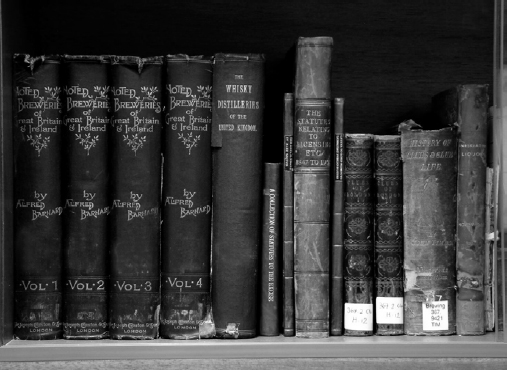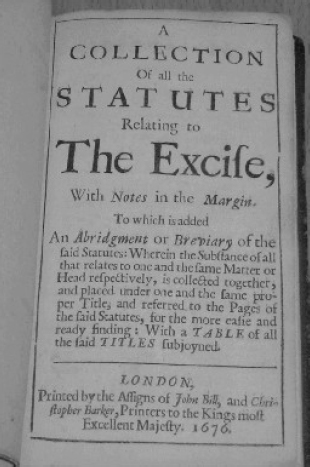
Copyright © 2004 the Brewery History Society
|
Journal Home > Archive > Issue Contents > Brew. Hist., 116, pp. 34-38 |
The National Brewing Library at Oxford Brookes University |
by Tom Martin |
The National Brewing Library (NBL) has a much broader content than perhaps its simple name suggests. Whether you are interested in the history of beer or whisky, maltings, breweries, pubs, cooperage, transport, bottle labels, inn signs or many other related subjects you should consider a visit to the NBL to assist your researches. This article explains how the library came about, what it contains and how you can access it.
As many readers will be aware, concentration and internationalisation of the brewing industry at the end of the 20th century led to a rationalisation of the professional and technical organisations supporting the industry.
|
|
 |
|
|
In January 2001, The Institute of Brewing (IOB), with origins going back to1886, and The International Brewers' Guild (IBG), which dated back to 1906, merged to form The Institute and Guild of Brewing (IGB). (In 2005 this organisation will change its name again to The Institute of Brewing and Distilling.) At about the same time the Brewers and Licensed Retailers Association (BLRA), formed as The Country Brewers' Society in 1822, becoming the Brewers' Society in 1904, reviewed its objectives and as the British Beer and Pub Association(BBPA), moved to smaller premises where they could no longer house their library.
Both the IOB and the IBG had held technical libraries and the BLRA had a particularly broad archive of books, journals and ephemera resulting from many years representing the industry to the public, pressure groups and the government. Under the auspices of the IGB these three collections were brought together to form the nucleus of the NBL.
Within the brewing industry the effects of the “Beer Orders” on major players and their withdrawal from brewing also resulted in release of archive material. Artefacts from the large Whitbread archive were sold at a dedicated auction but, through the good offices of the Whitbread Archivist, Nick Redman, the bulk of the books were donated to the NBL. As a result of the Allied Breweries merger with Carlsberg's UK interests and further sale of the Burton Brewery, the Allied Breweries research library has been donated also to the NBL. These major accessions have been accompanied by many smaller, but valuable, donations from both companies and individual friends of the IGB.
The present NBL collection is basically English language and in addition to long runs of major UK and international technical and trade journals it contains some 4,500 individual items. The library continues to collect new material through both purchase and donation and is negotiating supply of reference copies of relevant journals in current publication. It is supervised by a Management Committee with representation from the IGB, BBPA and Oxford Brookes University.
Readers should note that the NBL concentrates on manufacture, technology and product aspects of the industry, it is not a major source of finance or licensing law. The minute books and business records of the BLRA are archived at the University of Warwick School of Business Studies. Those from the Whitbread Archive are deposited at London or County Record Offices according to their geographical origin. The recovery and dispersal of the Allied Breweries business archive has been described in this Journal recently by Ray Anderson (Issue 112, Summer 2003, pp48-59).
The IGB advertised widely for a suitable partner who could house and assist in maintenance of the library. There was a limited response to this appeal but the IGB was fortunate in attracting a sympathetic response from Oxford Brookes University. The University library has developed a su`ccessful policy of attracting and housing specialist collections especially in the fields of the history of medicine, public health, food and drink. The University also has strong academic links with the brewing and distilling industries.
With the aid of a generous grant from the IGB Grants Committee, the NBL is now housed, on permanent loan, in a dedicated room in the university library where it complements the John Fuller collection of some 6,000 books on catering, cooking and gastronomy. In 2005 the NBL will move again to a specialist wing being built to house these collections.
Although the NBL has not found a preferred London location it is in a home in a major city with good public transport access and has guardians with a long term commitment to its use and viability.
Capitalising on the long history of the founding partners the library contains most of the major historical brewing texts such as the 18th Century “London and Country Brewer”, Combrune and Richardson, through to the late Victorian masterpieces, Alfred Barnard's “Noted Breweries of England and Ireland” and the “Distilleries of the United Kingdom”. Journals include, for example, the “Country Brewers' Gazette” (1877-1904) and the “Brewers' Journal (1865-1967) with many period advertisements and illustrations.
Of the collection's 4,500 items, some 2,000 are not found in the catalogues of the British or other major libraries. Some of these items appear unique, others are industry reports, foreign language publications, company and pub histories etc., which would not normally be held in libraries, although they may not be rare within the industry. The NBL Catalogue, for the first time, brings these diverse books and documents together to provide an extensive research resource.
Major sections of the library include –
The NBL is a reference library and items are not available on loan.
The NBL Catalogue and access details are available on-line at
http://www.brookes.ac.uk/services/library/speccoll/brewing.html
Catalogue entries are by author and title and unfortunately a key word search may not reveal a wealth of information contained in the broad ranging texts of many volumes. As part of a university library, the system is geared to students making their own searches for information and resources to answer detailed enquiries are limited – thus the need to make at least one exploratory visit!
For readers not on the Internet, the NBL is housed in the Headington Library on the Gipsy Lane Campus and all enquiries should be addressed to
- National Brewing Library Enquiries
- Attention of Donald Marshall
- Oxford Brookes University Library
- Gipsy Lane
- Oxford OX3 OBP
- Tel: (01865) 483136
- Fax: (01865) 483998
- E-mail: dmarshall
brookes.ac.uk
The library is open to bona fide researchers on prior application either in person or by post. Applicants will be required to complete a form giving their reasons for wishing to consult material in the library and provide proof of their address. Rules for the use of the library will be provided to approved applicants.
Admission to the NBL is during normal University Library opening hours but some rare and valuable items, kept in locked cabinets are available only Monday to Friday, 9.00am to 5.00pm.
|
|
 |
|
|